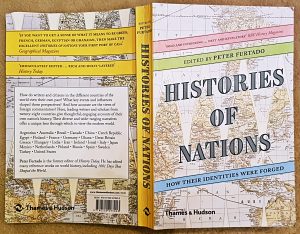
This month, I indulged in revisiting history.
Histories of Nations, by Peter Furtado, gathers the accounts of 28 historians on the nationalism in their respective 28 countries. Where it comes from, how it rose, its intricacies, how it differs from the foreigners view.
It is an engaging book, each countries being covered in separate chapters that read as easily as an article. The chapters are 8 to 10 pages long, which is short when covering the history of a whole nation. Yet the summaries are thorough and, because they are written by locals, there is always an element in each that will be unexpected. Well… Except maybe France for me.
Histories of Nations reminds you that nationalism is not just based on the events of History, but how they are lived, felt, interpreted, rejected, glorified, and… taught – both within and outside the country where they took place.
A good read, rich in information, I recommend you pick it up, refresh your memory, and review your vision of you neighbour nations and beyond.
Here is the list of the 28 countries covered and their subtitles. I hope this will trigger your curiosity:
– Egypt: Pharaohs, kings and presidents
– India: The civilization with no home-grown history
– Iran: A long history and short-term society
– Greece: A land caught between ancient glories and the modern world
– China: History writing: linking the past and the future
– Ireland: In the shadow of the fond abuser
– Spain: Beyond the Black Legend
– France: The history of the hexagon
– Russia: Fractures in the fabric of culture
– Czech Republic: National history and the search for identity
– Poland: Tragedy and heroism in the face of powerful neighbours
– Hungary: The thousand-year realm
– Turkey: The land with a lost empire
– Brazil: The legacy of slavery and environmental suicide
– Mexico: The land of the eagle, the cactus and the snake
– The Netherlands: Facing the challenges of water
– Sweden: From Viking community to welfare state
– Great Britain: The confected nation state
– The United States: The land that chose to be without history
– Australia: A European nation in an ancient land
– Ghana: From colony to continental leader
– Finland: Carving an identity from struggle
– Argentina: Between two centenaries
– Canada: The loose-jointed polity
– Italy: Catholicism, power, democracy and the failure of the past
– Japan: From isolation to transgression
– Germany: The many mutations of a belated nation
– Israel: The Zionist experiment
Thank you for reading,
Yours, Virginie